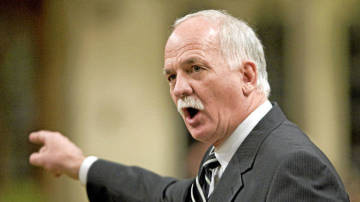[The following Globe and Mail editorial points out that the RCMP’s proposed review agency will have no oversight over the Mounties’ national security duties. However, the editorial overstates the new agency’s powers in other areas, which will be limited to making recommendations which the RCMP or government can reject. More about that here.]
RCMP: Keep the barns from burning
A review body with wide powers but little to review
will fall short of rebuilding trust in the RCMP
An editorial in the Globe and Mail, June 15, 2010
Public Security Minister Vic Toews, shown during Question Period
in the House of Commons in 2009. Photo: Canadian Press
A new civilian review body for the RCMP with powers to compel testimony is surely a good thing, but does the new body have a mandate to review the Mounties’ national-security work? Can it review the Integrated Market Enforcement Team on corporate crime? What about the Mounties’ work on organized crime? The answers may prove to be no, no and no. That would be akin to creating a hockey team, and forgetting about the goalie, the forwards and the coach.
There is an urgent need for a review body with powers to examine the national-security work of the RCMP and more than 20 other federal agencies engaged in such work. That was the message from Mr. Justice Dennis O’Connor, who held a 2 1/2-year inquiry into the Syrian torture of Canadian citizen Maher Arar.
It wasn’t just that mistakes by the Mounties set in motion Mr. Arar’s deportation from the United States to Syria. It was that the then-commissioner of the RCMP, Giuliano Zaccardelli, knew they were mistakes, and did a great deal to keep those mistakes secret from the solicitors-general of the day.
The RCMP is deeply involved in national-security work, without oversight. It has come full circle since the early 1980s, when the Canadian Security Intelligence Service was set up to handle domestic spying, after an inquiry found the Mounties engaged in various lawbreaking activities such as the burning of a Quebec barn. Not only is the RCMP back in the security business, it is free to break the law in limited circumstances, under a law passed after Sept. 11, 2001. “The new reality is that the RCMP in 2009, in order to detect, investigate and disrupt terrorist activity, could do the very activity that helped give rise to the McDonald Commission and the creation of a civilian national security organization,” Paul Kennedy, the former head of the Commission for Public Complaints Against the RCMP, said in a speech in November, 2009. “Since December, 2001, the RCMP is authorized in law to burn the barn.”
Public Safety Minister Vic Toews must think Canadians have a short memory. In his announcement yesterday, he said the new review body addresses concerns raised by Judge O’Connor, Mr. Kennedy and others. Was he talking about mostly peripheral concerns, or the main one?
Restoring confidence in the national police force means, among other things, making sure it respects civil liberties as it fights terrorism. Mr. Toews promises the new review body double the money of the old, but does he still wish to keep its blinders on? “I can with confidence say that little if any of the RCMP’s activities in their role as a national police force comes to the attention of the commission,” Mr. Kennedy said in his speech.
A review body with wide powers but little to review will fall short of rebuilding trust in the RCMP.
Back
